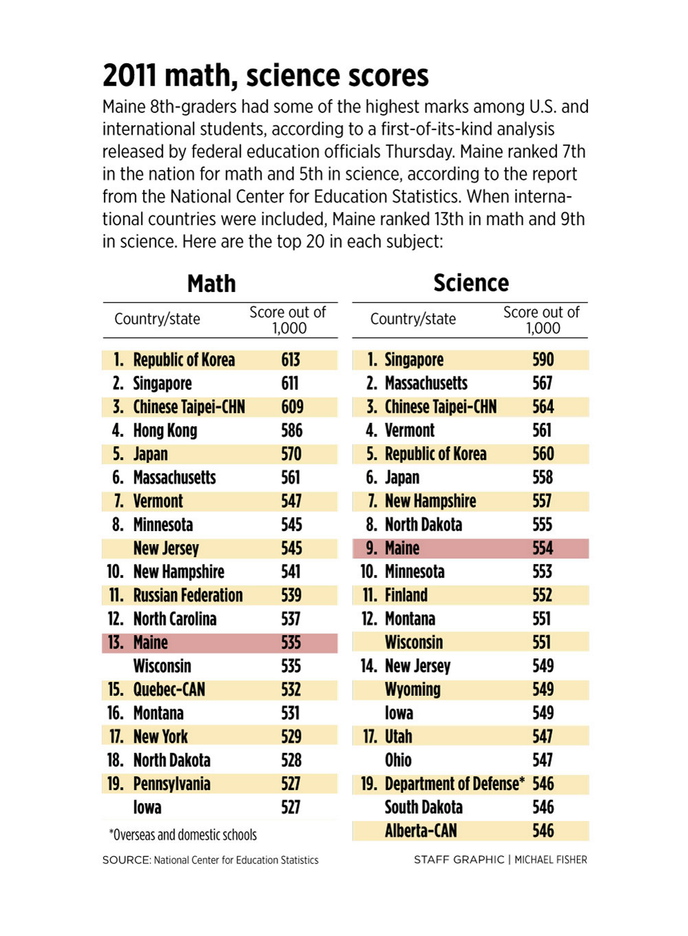Maine’s eighth-graders scored among the best in the nation in math and science in a first-of-its-kind federal study that compared results from all 50 states and other countries.
For the United States, Maine ranked seventh in math and fifth in science, says the report from the National Center for Education Statistics, an arm of the U.S. Department of Education. When other countries were included, Maine ranked 13th in math and ninth in science.
“These are great results with eighth-graders,” said Rachelle Tome, chief academic officer in the Maine Department of Education. “There has always been this belief that Maine has had rigorous standards compared to the rest of the country all along, and this kind of verifies that.”
In science, Massachusetts was second behind the top scorer, Singapore. Taiwan was next, followed by Vermont. In addition to Maine, the top 10 also included South Korea, Japan, New Hampshire, North Dakota and Minnesota.
“We conducted this study because it’s important to know how students educated in U.S. states are performing against international standards. We found that most eighth-graders in the U.S. are competitive in math and science,” said Jack Buckley, commissioner of the National Center for Education Statistics. “Still, our leading states are behind the highest-performing countries.”
Science education has been the subject of much attention in Maine, with Gov. Paul LePage emphasizing the need for more science, technology, engineering and mathematics training to ensure that Maine students can compete globally.
Tome said she’s taking the results with a grain of salt. She said she wants to look at the results year over year and try to figure out why, if Maine’s eighth-graders are scoring so well in math and science, they don’t do as well on math and science tests in the 11th grade.
Last week, statewide test results for 11th-graders showed that not even half were considered proficient – performing at or above grade level – in math or science.
The number at or above grade level in math, based on the SAT, was 48 percent. For science, a state-created exam, only 41 percent were at or above grade level.
“I get more concerned when I look at the SAT data,” Tome said.
Asked why scores dip from eighth grade to 11th grade, Tome said, “That’s the $50,000 question. That’s one of the things we’re trying to explore: If we’re seeing positive results in eighth grade, why do we see the shift?”
She noted that students go through a big transition from middle to high school, where they are expected to be more self-sufficient. That and other factors could play a role, she said.
“That said, I don’t want to diminish good news,” Tome said. “These results, along with (those of) many New England partners, shows we’re in the right direction.”
The federal study compared every state, the District of Columbia and Defense Department schools against 38 countries and nine subnational education systems based on how students did on a test called the Trends in International Mathematics and Science Study. The subnational systems include Taipei, Hong Kong and Ontario, which reported results independently.
It’s the first time that federal education officials have compared all U.S. states with more than 40 international counterparts where students take the test. Only nine states take the test; Maine is not among them. For states where students don’t take it, the Education Department used eighth-grade test results in math and science to predict the scores.
The scores were ranked on a scale of 1,000.
In math, the average statewide scores ranged from 561 for Massachusetts to 466 for Alabama. Maine scored 535, seventh in the nation and 13th overall including international counterparts. The highest overall math score was 613, for Korea.
In science, the average statewide scores ranged from 567 for Massachusetts to 453 for the District of Columbia. Maine scored 554, fifth in the nation and ninth overall. The highest overall science score was 590, for Singapore.
U.S. Secretary of Education Arne Duncan called the results “good news, bad news.”
“(The study) is important because it provides, for the first time, a robust comparison of how students in each of the 50 states perform in math and science, compared to their international peers,” Duncan said in a prepared statement. “The good news is that (the study) finds that in most states our students are competitive with their global peers in mathematics and science. In 36 states, eighth-graders perform above the international averages in both mathematics and science.
“The bad news is that students in even our highest-performing states – Massachusetts and Vermont – cannot compete in math with students from the highest-performing education systems, such as Korea, Singapore, Hong Kong and Taiwan,” he said.
Noel K. Gallagher can be contacted at 791-6387 or at:
ngallagher@pressherald.com
Copy the Story LinkSend questions/comments to the editors.





Success. Please wait for the page to reload. If the page does not reload within 5 seconds, please refresh the page.
Enter your email and password to access comments.
Hi, to comment on stories you must . This profile is in addition to your subscription and website login.
Already have a commenting profile? .
Invalid username/password.
Please check your email to confirm and complete your registration.
Only subscribers are eligible to post comments. Please subscribe or login first for digital access. Here’s why.
Use the form below to reset your password. When you've submitted your account email, we will send an email with a reset code.